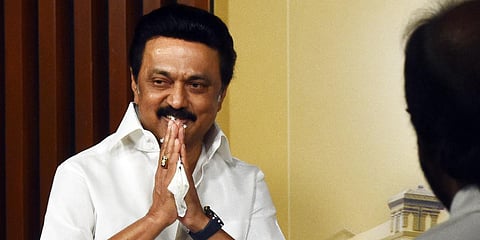

Chief Minister MK Stalin on Monday introduced a bill in the state assembly seeking permanent exemption for Tamil Nadu students from appearing for the National Eligibility cum Entrance Test (NEET) for admission to the undergraduate medical degree courses. The bill further seeks to provide admission on the basis of marks obtained in the qualifying examination (Plus Two), through normalization methods.
Stalin said this would ensure social justice, uphold equality and equal opportunity, protect all vulnerable student communities from being discriminated against, and bring them to the mainstream of medical and dental education, and will ensure robust public health care across the State particularly the rural areas.
Condoling the death of yet another student due to NEET, the Chief Minister said the legal war against the NEET has begun with this Bill which has a stronger legal basis for dispensing.
Explaining the reasons for opposing the NEET, the Chief Minister said "On and from the academic year 2017-2018, admission to all medical education institutions throughout the country in the undergraduate and postgraduate level is based on the marks obtained in the uniform entrance examination i.e. National Eligibility-cum-Entrance Test (NEET)."
"A detailed study, whether the NEET-based admission process has adversely affected the social, economic, and federal polity and the students of rural and urban poor, those who studied in government schools, those who studied Tamil medium or any other section of students in Tamil Nadu, was undertaken by a high-level committee. The committee in its finding has reported that the NEET has clearly undermined the diverse societal representation in MBBS and higher medical studies, favouring mainly the affordable and affluent segment of the society while equally thwarting the dream of pursuing medical education by the underprivileged social groups."
The Chief Minister further said the analysis in multiples of dimensions related to Socio-Economic and Other Demographic Status (SEODS) of those who have competed for medical education has proved this fact.
In particular, the NEET has deserted the representation of the social and other demographic groups having low SEODS in medical education. Those social groups which were most affected were the students of Tamil medium, having a rural background of government schools, those having parental income less than 2.5 Lakhs per annum, and the socially depressed and disadvantaged groups like most Backward Classes, Scheduled Castes, and Scheduled Tribes. Therefore, the Committee concluded that the NEET is against these disadvantaged groups.
"The NEET does not seem to ensure merit or standard of the students being offered MBBS under its purview. The findings indicate that the NEET has only enabled and empowered comparatively the low performing (in NEET scores and HSc scores) students to get admission to MBBS. Therefore, the question of NEET ensuring quality and merit of the students is to be ruled out," Stalin pointed out.
Comparatively, it has been observed that the HSC marks based on which admissions were offered during the pre-NEET period ensured entry of quality and meritorious students. The Committee has recommended, among others that the State Government may pass an Act, similar to that of the Tamil Nadu Admission in Professional Educational Institutions Act, 2006 (Tamil Nadu Act 3 of 2007) indicating the need for elimination of NEET at all levels of Medical Education and get the President's assent for the same. This will ensure social justice and protect all vulnerable student communities from being discriminated against in admission medical education programs.
The Chief Minister also said it is evident from the Commission's report that NEET is not an equitable method of admission. The experience of the past four years of NEET has shown that the exam has shattered the hopes and dreams of Tamil Nadu students aspiring for admissions to medical and dental courses, particularly, students from the socially and economically backward classes.
The extra examination which students are compelled to face, other than the qualifying examination has caused a huge financial burden to the students from socially and economically backward classes. It festers inequality, as it favors the rich and more privileged class of society who are able to afford special coaching, apart from pursuing Class XII.
It virtually barricades the underprivileged social groups from medical and dental education. This is against the very object of the equality clause enshrined in the Constitution, and it also infringes the right to education of the children from these underprivileged classes of society. Further, these students from the affluent class, after the undergraduate course, do not serve in the rural areas. They often pursue a post-graduate course abroad. Thus, the number of serving doctors in the State is declining.
It is also spurious to suggest that NEET improves the standard of medical education. The standard of medical education is maintained during the undergraduate course by following the syllabus and curriculum prescribed by the National Medical Commission and exams conducted by the University before awarding the degree. Students who are not able to pass the university exams are not awarded degrees.
Therefore, it is not during the admission stage that the standard of medical education is maintained. Further, even before 2017, Tamil Nadu had one of the highest numbers of medical and dental educational institutions and the standard of medical and dental professional graduating from these institutions were of high mettle. Hence, merely because admission is done on the basis of a qualifying examination, in this State, it would in no way lower the standard of education since the higher secondary syllabus is of a sufficient standard. If the marks are adjusted through a normalization method, it would provide a just, fair, and equitable method of admission.
Admissions to medical education courses are traceable to entry 25 of List III, Schedule VII of the Constitution of India. Therefore, the State is competent to regulate the same against the underprivileged social groups.